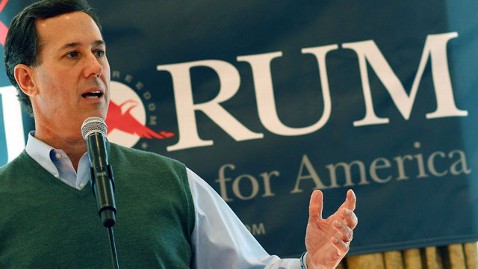After Meeting, Conservative Leaders Rally Around Santorum

(Mark Wilson/Getty Images)
About 150 conservative and evangelical leaders said today they decided after a private meeting Friday night that Rick Santorum is the best candidate to support in the Republican presidential primary.
The meeting reflected conservatives' desire to stop Mitt Romney's momentum before the Jan. 21 primary in South Carolina, where evangelical voters are expected to play a significant role.
The leaders met at a ranch outside Houston and heard from surrogates from all of the candidates' campaigns - except for Jon Huntsman's - and after three rounds of balloting, Santorum was chosen.
Tony Perkins, the president of the Family Research Council, described the support for Santorum as a "strong consensus" after "a vigorous and passionate discussion."
Perkins said that he expected "some activity" within 24 hours of the endorsement, though he stayed vague on the matter and hinted only that some groups and leaders would make their official support known in that time.
Santorum, Newt Gingrich, Rick Perry and Ron Paul survived the first round of balloting, which had all the candidates listed as options, Perkins told reporters on a conference call this morning. After a second round, Santorum and Gingrich emerged as the favorites, and after a final, third round, Santorum won at least two-thirds of the vote, Perkins said.
Santorum has ridden into New Hampshire and South Carolina with a swift wind behind him after he virtually tied Romney in the caucuses in Iowa, where evangelical voters gave him a much-needed boost.
"He has a record of stability," Perkins said. "He's reliable."
Perkins, who described himself as a spokesman for the 150 conservatives who met in Texas, said the discussion focused on "the positive," not Romney-bashing. "There was some discussion" of Romney's positions on abortion, however, he said.
"Not a lot of time was spent on Mitt Romney," he said.
The leaders did note that Santorum has struggled to raise as much money as the other candidates have, though Perkins said "those issues can be corrected," expressing hope that the group's support for him will bring about more fundraising.
Many conservatives fear that Romney will run away with a win in the South Carolina primary if conservative voters are split among more than one candidate, similar to what happened in 2008 when John McCain won the vote there.
The conservatives didn't discuss the possibility of Perry, who is pressing on in South Carolina despite poor showings in the contests in Iowa and in New Hampshire, dropping out of the race, Perkins said. He did say that they discussed whether leaders who supported Gingrich would be willing to switch sides and back Santorum, though he cautioned that not all Gingrich supporters are prepared to do so.
The biggest issues discussed at the meeting were repealing President Obama's signature health care law, cutting the deficit and reducing government spending, Perkins said. After the discussion, Perkins said, they determined that Santorum "best reflected the conservative movement."